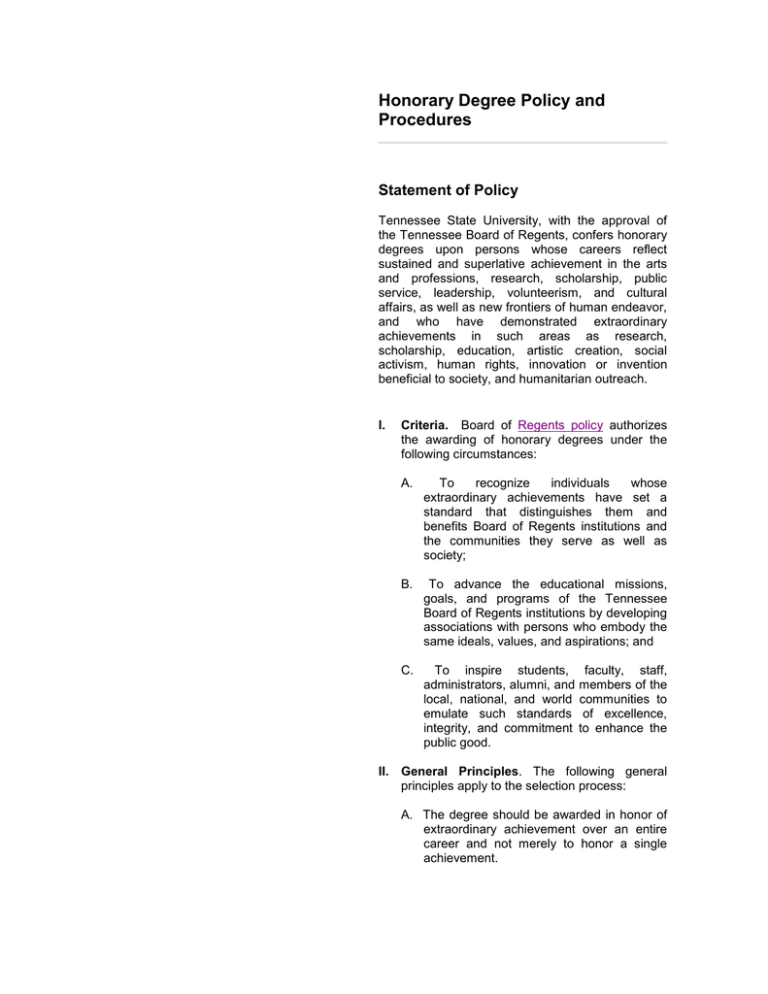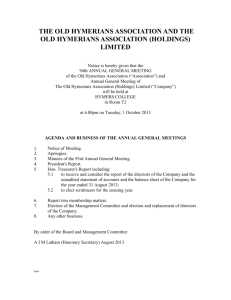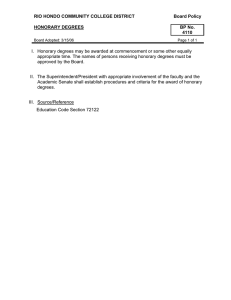Honorary Degree Policy and Procedures Statement of Policy
advertisement

Honorary Degree Policy and Procedures Statement of Policy Tennessee State University, with the approval of the Tennessee Board of Regents, confers honorary degrees upon persons whose careers reflect sustained and superlative achievement in the arts and professions, research, scholarship, public service, leadership, volunteerism, and cultural affairs, as well as new frontiers of human endeavor, and who have demonstrated extraordinary achievements in such areas as research, scholarship, education, artistic creation, social activism, human rights, innovation or invention beneficial to society, and humanitarian outreach. I. Criteria. Board of Regents policy authorizes the awarding of honorary degrees under the following circumstances: A. To recognize individuals whose extraordinary achievements have set a standard that distinguishes them and benefits Board of Regents institutions and the communities they serve as well as society; B. To advance the educational missions, goals, and programs of the Tennessee Board of Regents institutions by developing associations with persons who embody the same ideals, values, and aspirations; and C. To inspire students, administrators, alumni, and local, national, and world emulate such standards integrity, and commitment public good. faculty, staff, members of the communities to of excellence, to enhance the II. General Principles. The following general principles apply to the selection process: A. The degree should be awarded in honor of extraordinary achievement over an entire career and not merely to honor a single achievement. B. Degree recipients will be selected as part of a participatory institutional process. Selection shall be made by a campus Selection Committee as follows: (1) (2) (3) (4) (5) (6) Recipients of the degree shall be selected by a Committee comprised of a minimum of fifty percent (50%) faculty. Recipients must be approved by the President and Board of Regents. The degree awarded shall be called an Honorary Doctor of Humane Letters. The degree is not to be granted for earned credit such as a Ph.D. Current university employees and individuals holding elected or appointed government office within the State of Tennessee are not eligible. Honorary degrees may be awarded to former employees who have been separated from the Board of Regents at least five years and former elected officials who meet the criteria. Nominees for public elective and/or appointed offices within the State of Tennessee are not eligible. Philanthropy cannot be a sole or main criterion for awarding an honorary degree, but may be taken into account as a factor to be considered by the Selection Committee in a determination to award an honorary degree. No more than two honorary degrees may be awarded per year. No individual will be allowed to receive more than one honorary degree from the same institution. C. Current or prospective benefactors. Current or prospective benefactors of the institution are not eligible unless they meet criteria outlined in section (I) (A) of this policy. D. Attendance at graduation required. The recipient must attend graduation to be awarded the honorary degree. Therefore, no nominations for posthumous degree awards will be accepted. E. President's approval required. The President must approve the nominee for the degree. III. Exceptions. No exceptions to this policy will be granted. Honorary Degree Selection Committee Procedures Membership The Selection Committee consists of the following seven (7) voting members: A chair and three associate/full professors appointed by the President based upon recommendations from the Vice President for Academic Affairs or a designee The Chair of the Faculty Senate or a faculty member recommended by the Chair The Chair of the Staff Senate or a staff member recommended by the Chair The Vice President for University Relations and Development or a designee The committee will also include an ex-officio (nonvoting) designee from the Office of the Vice President for Academic Affairs. Nominations The committee shall issue a call for nominations every August. Nominations should be sent to the chair of the Selection Committee. To ensure broad participation and to reduce costs, nominations will be solicited using the University's electronic communications (internet or intranet) systems. All nominations must be in writing. The following schedule will be followed: Call for Nominations Committee Review and Deliberations Nominee Recommendation Sent to President Nominee Recommendation Sent to Paula Short Recommendation Sent to Chancellor Chancellor Approves Recommendation Nominee Notified of Selection Protocol Officer Notified of Selection Conferring of Honorary Doctor of Humane Letters August 17 through September 15, 2010 September 17, 2010 September 20, 2010 September 24, 2010 September 30, 2010 October 8, 2010 October 15, 2010 October 15, 2010 December 18, 2010 Candidates who are not recommended for a degree during any year may be subsequently considered upon re-nomination. Nominations received after the August nomination period will be considered by the Selection Committee at the next, annual cycle. Terms Committee members serve for three years, but with appointments staggered to ensure continuity and overlap of terms. Selection and Approval Process To be recommended, a nominee must receive a minimum of four positive votes from members of the Committee. It is not required that all committee members vote or be present for a recommendation to the President to be binding. The selection and approval process is as follows: 1. 2. 3. 3. 4. 5. 6. Nominations will be solicited from the University community via Outlook Exchange and MyTSU with the instruction that nominations be sent to the Selection Committee. The Selection Committee chair may receive nominations electronically or in hard copy. Complete nominations must include a letter from the nominator, supporting documentation detailing why the candidate is deserving of an honorary degree from Tennessee State University, and the candidate's CV or a biographical statement. The committee will consider the nominations and forward a recommendation to the President. If the recommendation approved, the President will transmit the nominee's name to the Board of Regents Vice Chancellor for Academic Affairs. The Vice Chancellor will review the recommended candidate for compliance with TBR policy and forward a recommendation to the Chancellor. Upon approval by the Chancellor, the President will notify the selected recipient. Confidentiality All deliberations will be confidential. Adopted: Revised March 22, 2010; Originally adopted August 17, 2009 Authority: TBR Policy #2:06:00:00, Awarding the Honorary Degree Source: Board Meeting December 3, 2004, Approved March 27, 2008 to take effect July 1, 2008

